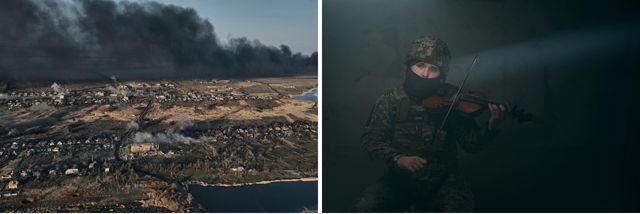
Зранена, але не зломлена!
Зранена, але не зломлена!
Саме такими словами можна охарактеризувати Україну від моменту повномасштабного вторгнення росії на територію нашої держави. Україна насправді зранена і ці рани ми бачимо на обличчях українців в окупації, на території бойових дій і, навіть, за кордоном. Тисячі вимушених переселенців понесли ці рани також і до відносно безпечних регіонів держави. Рани нашого народу ще довго будуть заживати, а деякі – назавжди затягнуться пам’ятними рубцями від жахів війни. Та разом з тим, зранена Україна продовжує жити й боротися, оскільки ворогу так і не вдалося її зламати. Відверто кажучи, такої стійкості від українців не очікував ніхто: ні сусідній ворог, ні західні партнери, які відводили українському опору буквально декілька днів.

Як служитель євангельської Церкви та координатор/керівник багатьох гуманітарних проєктів, я можу впевнено стверджувати, що за 2 роки великої війни Україна пройшла через важливий етап суспільних змін.
У цьому контексті важливе місце посідає загальнодержавний волонтерський рух, який вже з перших днів війни продемонстрував єднання та стійкість українського народу. І це є своєрідним феноменом війни, оскільки тисячі людей без будь-якої підготовки та програми дій об’єдналися навколо допомоги один одному. Цінність цього феномену також пов’язана з тим, що такий потужний волонтерський рух виник у молодій державі, яка десятиліттями перебувала під пильним оком радянської комуністичної диктатури. Така диктатура заперечувала будь-які вільні та позапрограмні об’єднання громадян у справах державності, власної ідентичності та свободи дій. Складно підрахувати, скільки тисяч українців волонтери евакуювали із зони бойових дій та окупованих територій, скільки тисяч тонн гуманітарної допомоги, ліків, предметів першої необхідності отримали та доставили нашим громадянам.
Загальнодержавний волонтерський рух тісно пов’язаний з церковними громадами, які завдяки чіткій організацій структурі та міжцерковним зв’язкам, у найкоротші терміни зуміли організувати розгалужену волонтерську систему. Можу сказати, що переважну більшість волонтерів на початку війни українському суспільству дали саме Церкви. Взагалі, коли ми говоримо про діяльність Церкви у період повномасштабної війни, то не можливо оминути її знакову роль у служінні українському народові. Складно відшукати церкву (євангельську), яка не приймала біженців або не займалася евакуацією людей, не здійснювала видачу продуктових наборів, одягу чи ліків, не підтримувала дітей, жінок чи людей похилого віку. Коли я бачу, як на деокупованих територіях волонтери з Церков відновлюють тисячі пошкоджених будинків, – я бачу прояв величезної Божої любові у зраненій Україні. Це значно більше ніж велике будівництво. Це про Божу любов, яка відбудовує пошкоджене та зруйноване.
Волонтерське служіння Церков позначилося і на переосмисленні ролі та місії Церкви. З певним часом у середині Церков почали відбуватися відкриті діалоги щодо місії Церкви. І в багатьох випадках Церкви переосмислили свою місію від сотеріологічної до більш цілісної місії – присутності Церкви в суспільстві. Все частіше Церкви починають являти Бога серед зраненого суспільства. Тобто фактично, зміщується акцент місії Церкви з Великого доручення на Велику заповідь.
У такий спосіб Церква стає більш відкритою до суспільства. Відкритість часто проявляється через гостинність, яка має багато різних форм. Все частіше я спостерігаю як Церкви створюють зони для вільного спілкування різних людей. Досить часто такі зони мають кавомашину чи термопот, де люди за філіжанкою кави або чаю можуть поспілкуватися на різні теми. Для людей, які відвідують Церкви з такими зонами спілкування, Церква відкривається по-новому.
У період великої війни Церква також заново переосмислює відношення щодо служби в армії. Це стало наслідком того, що лише в Баптистському союзі понад 400 служителів Церков проходять службу в ЗСУ. Велика частина братів долучилася до капеланського служіння всередині українського війська.
Неможливо також оминути того, що у період війни у нашому суспільстві відбувається переосмислення цінності людського життя. До початку повномасштабного вторгнення росії ми не бачили такої величезної кількості смертей, а тому не в повній мірі усвідомлювали цінність життя іншої людини. Війна змінила це, тепер ми більш глибоко усвідомлюємо цінність та дар життя.
Війна також вплинула на міграцію українців. Близько 6,5 млн українців через війну були вимушені залишити Україну, ще близько 3 млн – стали переселенцями всередині своєї країни. Але як ті, хто опинився за кордоном, так і ті, хто має статус «ВПО», продовжують підтримувати український народ, Збройні Сили України. Через велику кількість українців, які поповнили ряди іноземних Церков, відбулося посилення співпраці між українськими Церквами та українськими церковними громадами за кордоном. Відносини між такими спільнотами віруючих завжди були досить складними, проте після початку повномасштабної війни вони значно покращилися.
Значний вплив війна справила на демографічні показники в Україні. На сьогодні неможливо точно визначити кількість загиблих українців серед цивільного населення. Залишається складним питанням розуміння чисельності українців на тимчасово окупованих територіях, особливо якщо враховувати вивезення за межі України тисяч людей, у тому числі й дітей. Невтішними є і показники народжуваності дітей. Якщо у «довоєнний» 2021 рік в Україні народилося 260 тис. дітей, то вже у 2022 році – цей показник становив вже 190 тис., а у 2023 році народилося трішки більше 178 тис. маленьких українців та українок (усі показники не містять даних щодо народження українців за кордоном).
Помітні зміни протягом останніх 2 років спостерігаються й в економіці України. Війна призвела до втрати великої частини бюджетних надходжень з промислових регіонів на сході країни та аграрних регіонів на півдні. Міграція за кордон також вплинула на зменшення кількості платників податків всередині країни. Варто відмітити, що у перші місяці війни Україна отримувала потужну гуманітарну допомогу з-за кордону, але це не призвело до звички чи залежності українців від гуманітарної допомоги. Навпаки, ми спостерігаємо, що опинившись в іншому регіоні держави, українці намагаються знайти роботу, відкрити власну справу, створити малий бізнес та, навіть, робочі місця.

Wounded but not Broken!
These words aptly characterize Ukraine since Russia’s full-scale invasion of our country. Ukraine is indeed wounded, and we witness these wounds on the faces of Ukrainians under occupation, in the war zone, and even abroad. Thousands of internally displaced persons have carried these wounds to relatively safe regions of the country. The wounds of our people will take a long time to heal, and some will be forever scarred by the horrors of war. Yet, despite these challenges, wounded Ukraine continues to live and fight, as the enemy has not managed to break it. Frankly speaking, no one expected such resilience from the Ukrainians: neither the neighboring enemy nor the Western partners who gave the Ukrainian resistance just a few days.
As a minister of the Evangelical Church and a coordinator of many humanitarian projects, I can confidently say that during the two years of the full-scale war, Ukraine has undergone an important stage of social change.
In this context, the nationwide volunteer movement occupies a significant place, demonstrating the unity and resilience of the Ukrainian people from the first days of the war. This movement is a peculiar phenomenon of the war, as thousands of people without any training or program of action have united to help each other. The value of this phenomenon is also related to the emergence of such a powerful volunteer movement in our young state that used to be under the watchful eye of the Soviet communist dictator state for decades. This dictator state denied any free and non-governmental associations of citizens in matters of statehood, identity, and freedom of action. It is difficult to calculate how many thousands of Ukrainian volunteers evacuated from the war zone and occupied territories, and how many thousands of tons of humanitarian aid, medicines, and basic necessities were received and delivered to our citizens.
The nationwide volunteer movement is closely connected with church communities, which, thanks to a clear organizational structure and inter-church ties, managed to organize an extensive volunteer system in the shortest possible time. I can say that the overwhelming majority of volunteers at the beginning of the war were provided to Ukrainian society by churches. In general, when we talk about the activities of the Church during a full-scale war, it is impossible to ignore its significant role in serving the Ukrainian people. It is difficult to find an evangelical church that did not host refugees or did not evacuate people, did not distribute food packages, clothing, or medicines, did not support children, women, or the elderly. When I see volunteers from the churches in the de-occupied territories restoring thousands of damaged houses, I see a manifestation of God’s great love in wounded Ukraine. This is much more than a big construction project. It is about God’s love rebuilding the damaged and destroyed.
The volunteer ministry of the churches has also led to a rethinking of the role and mission of the Church. Over time, open dialogues about the mission of the Church began to take place within the churches. And in many cases, the churches have rethought their mission from a soteriological one to a more holistic mission – the presence of the church in society. Increasingly, churches are beginning to reveal God among a wounded society. That is, in fact, the emphasis of the Church’s mission is shifting from the Great Commission to the Great Commandment.
In this way, the Church becomes more open to society. Openness is often manifested through hospitality, which has many different forms. More and more often I see churches creating areas for free communication between different people. Quite often, these areas have a coffee machine or a thermopot, where people can talk about various topics over a cup of coffee or tea. For people who attend churches with such areas of communication, the church opens up in a new way.
During the full-scale war, the Church also rethought its attitude toward military service. This was the result of the fact that in the Baptist Union alone, more than 400 church ministers serve in the Armed Forces. Many of these men have joined the chaplaincy ministry within the Ukrainian army.
It is also impossible to ignore the fact that in times of war, our society is rethinking the value of human life. Before Russia’s full-scale invasion, we had not seen such a huge number of deaths and therefore did not fully realize the value of another person’s life. The war changed this, and now we are more deeply aware of the value and gift of life.
The war also affected the migration of Ukrainians. About 6.5 million Ukrainians were forced to leave Ukraine because of the war, and about 3 million more became internally displaced. But both those who found themselves abroad and those who have the status of “IDPs” continue to support the Ukrainian people and the Armed Forces of Ukraine. Due to the large number of Ukrainians who have joined the foreign churches, cooperation between Ukrainian churches and Ukrainian church communities abroad has increased. Relations between these communities of believers have always been quite difficult, but they have improved significantly since the outbreak of full-scale war.
The war has had a significant impact on demographics in Ukraine. Today, it is impossible to accurately determine the number of Ukrainian civilian casualties. It remains a difficult issue to understand the number of Ukrainians in the temporarily occupied territories, especially if we take into account the deportation of thousands of people, including children. The birth rate is also disappointing. While in the “pre-war” year of 2021, 260 thousand children were born in Ukraine, in 2022 this figure was already 190 thousand, and in 2023 a little more than 178 thousand young Ukrainians were born (all figures do not include data on the births of Ukrainians abroad).
Ukraine’s economy has also undergone significant changes over the past 2 years. The war has led to the loss of a large part of budget revenues from industrial regions in the east and agricultural regions in the south. Migration abroad has also contributed to a decrease in the number of taxpayers in the country. It is worth noting that in the first months of the war, Ukraine received strong humanitarian aid from abroad, but this did not lead to a habit or dependence of Ukrainians on humanitarian aid. On the contrary, we have seen that once in another region of the country, Ukrainians try to find work, start their own small businesses, and even offer jobs opportunities to other compatriots.









